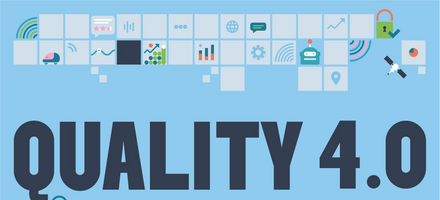
Baltic Exchange: A move to Quality 4.0
An in-depth look into how governance, assurance and improvement activities were enhanced through the implementation of Quality 4.0 at maritime and freight market information provider, the Baltic Exchange.
Digitalisation and Quality 4.0 has been fast-forwarded by the Covid-19 pandemic, and the Baltic Exchange has had to implement the new system remotely, bringing huge positive changes to people through digital working. This case study explores how the Baltic Exchange moved to a digitalised system (Quality 4.0), in which their governance, assurance and improvement activities were achieved with robust methodologies using data science and data analysis.
Businesses and organisations are continuing to evolve out of necessity, responding to an onslaught of disruption, new business models and technology. This continuous change, including that precipitated by the global coronavirus pandemic, is affecting business operations at all levels, with customers demanding real-time interactions, regulators applying increasing levels of scrutiny and governance and stakeholders requiring assurance in this complex and dynamic risk environment. Rashad Issa, Quality and Business Lead at the Baltic Exchange, commented, “Assurance for quality professionals, not having the level of integration of technology would have made the job impossible."

“Assurance for quality professionals, not having the level of integration of technology would have made the job impossible. We would have had to look at over 1,000 indices averaging 4,000 distinct data points, to be examined on a daily basis. It would have been impossible to publish daily as required. Quality 4.0 has moved from spotting errors to predicting them.”
Rashad Issa Quality and Business Lead Baltic Exchange
This case study was commissioned to take an in-depth look into how governance, assurance and improvement activities were enhanced through the implementation of Quality 4.0 at the maritime and freight market information provider. The CQI believe that ‘Quality 4.0’ (Q4.0) and the principles which underpin it will directly affect an organisation’s ability to deal with these huge changes in the digital era and, by extension, its ability to successfully uphold the established seven quality management principles. Before this can happen, however, Q4.0 needs to be properly understood, defined, and developed. Consequently, they have funded a research project into the Why, What and How of Q4.0, which has been carried out by the Oakland Institute and Leeds University Business School.
The How, or the implementation of Q4.0, has been examined through a series of interviews with practitioners, structured using the CQI Competency Framework elements, to determine which practices, technologies and tools are being used in their organisations. Part of that work has led to the development of a selection of illustrative ‘case studies,’ of which this is one of the first.
Read more about the programme of research commissioned by the CQI on Quality 4.0

